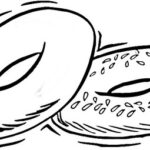In her compelling fifth collection, Trinity Street, Jen Currin presents readers with poems that are characteristically insightful, astute, and vibrant. Continuing the dynamic and free-flowing style found in her previous works, Currin’s poetry in Trinity Street resonates with the spirit of the New York school, now transplanted to the unique urban landscape of Vancouver. This is a distinctly “local” poetry, deeply rooted in Currin’s experiences within the social, political, and artistic fabric of Vancouver, a city depicted in her poems as often rain-soaked, shrouded in fog, and marked by the dampness of its rainforest setting.
The collection’s title, Trinity Street, refers to an actual street in Vancouver, but as revealed in the title poem, it also symbolizes “a garden holy / with unburdened bodies.” This envisioned idyllic space, free from human cruelty and environmental disregard, forms a core ideal in these poems. The poems in Trinity Street intensely examine various relationships – connections to place, to living and departed figures in the poet’s life, and to the very act of writing poetry itself.
The opening poem, “From Surrey to Commercial Drive,” introduces a conversation between two poets. One poet expresses a desire to “take fewer / leaps in his poems, to stick a little / longer with one thing,” suggesting that the “leaping / has become too easy.” However, Currin, with a seemingly playful disregard, embraces and intensifies this very “leaping” quality in Trinity Street. For Currin, this associative movement from one image, emotional tone, fleeting thought, or snippet of speech to the next is as natural as the sudden lurch of a bus. “This poetry winks” at Currin, suggesting that this associative style mirrors the inherent dynamism of movement – vehicular, physical, and cognitive – while also being inherently enjoyable. Expanding the view, this textual self-awareness intertwines with a sense of continuity that spans Currin’s entire body of work, both in poetic style and subject matter. The associative leaps within Trinity Street poems often position the poet as an observer on the periphery. As noted in “Periphery” and elsewhere, this detached stance becomes a crucial element of Currin’s poetics, offering perspective and enabling a rich layering of relational, auditory, and speech-based elements within each poem. Everything encountered – a passerby, a fleeting image, or overheard words – becomes valid material, seamlessly integrated into the poetic fabric.
When not positioned as a peripheral observer for the sake of poetry, Currin seems intent on pushing certain aspects of modern life to the periphery, notably technology and excessive thought. These elements are portrayed as potential hindrances to poetic creation and, more broadly, to genuine connection with oneself and others. The pervasive presence of cell phones – whether “broken,” “dead,” or actively in use within the poems – signals a yearning for alternative forms of attention, perhaps directed towards poetry or loved ones. Intriguingly, this desire for alternative attention is highlighted by the very inclusion of cell phones in numerous poems, particularly in the collection’s first half. Poems such as “Where Buildings Pose as Mountains,” “Friday Mouth,” and “Dear Healing Walk” are subtly haunted by figures “looking down / into the face of” a phone, by “ancestors / who call,” and a “dead cousin [who] called my cell.” The cell phone, as both intermediary and conduit, and as a symbol of our turbulent era, is transformed into a “fear instrument they were / always buying/updating.”
Currin’s writing acknowledges the inherent incompleteness of life and communication; “No one ever completes”; words trail off, loops remain open, calls are dropped or unanswered. This struggle for connection deeply informs the undercurrent of grief that permeates the poems: “the deaths are often sooner / than expected.” Many poems take the form of epistles, addressing deceased family, close friends, and the looming environmental crisis. As the opening line of “Come Together” declares: “This historical moment is overwhelming—” Similarly, in “Dear Prince of Melting Icecaps”: “We are in a state. A state.” This state, as explored in “Procure,” brings to the forefront “insufficient politics,” and Currin asserts being “not / interested in polarizing rhetorics— / poet or politician.” Here, Currin suggests that her poetic pursuit transcends binary oppositions. Could this be the underlying reason for the all-encompassing, leaping, and associative nature of her poems? Perhaps, in part. With “ink & intention,” “poets can say things / like that,” addressing profound aspects of life and poetry, as Jen Currin masterfully demonstrates in the moving and insightful poems of Trinity Street.

